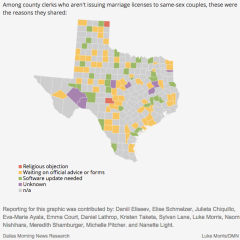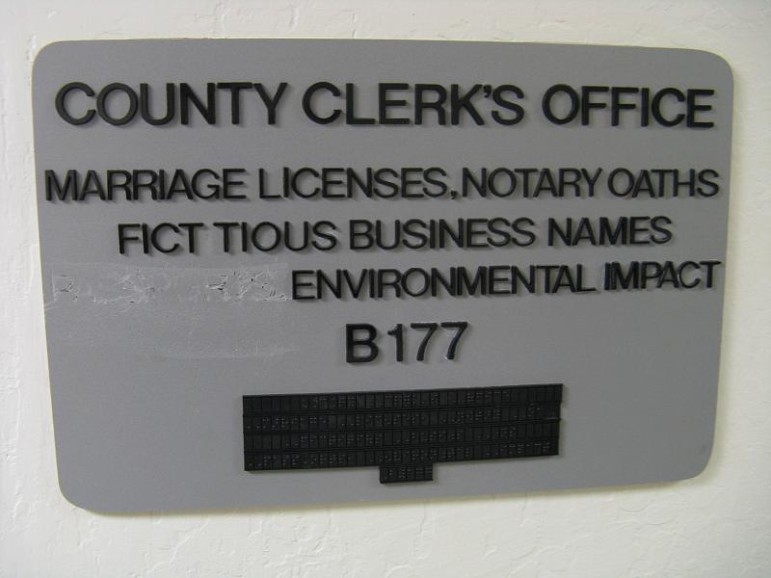Guest post by Daniel Bennett
Just days after the Supreme Court’s decision in Obergefell v. Hodges, stories emerged from around the country of clerks and other officials who objected to issuing licenses in response to the ruling. Most cited their religious beliefs as motivation.
“In good conscience I cannot put my name on one of those licenses,” one Kentucky clerk said.
A Texas clerk pledged to “only issue marriage licenses consistent with Texas law, so help me God.”
This raises an obvious question: can government officials really do this?
Clerks who refuse to issue licenses to same-sex couples have their work cut out for them if they are to prevail. As state employees they are responsible for executing state law, regardless of religious beliefs.
But if they can convince a court that the state is coercing them into violating their deeply held convictions, and if a reasonable alternative arrangement exists, then they may have a shot.
It will be up to the courts to decide what is “reasonable” and what isn’t. A court may see it as reasonable for a couple to wait a few extra minutes while the marriage office quietly arranges for a different employee to issue the license. But the longer the wait and less equal the treatment, the less likely the courts are to see the religious exception as acceptable. Plus, some offices may not have anyone willing to grant the license. What then?
Last week, a video of a same-sex couple went viral after it showed them being denied a marriage license at their county clerk’s office. The clerk, Kim Davis, had earlier decided to stop issuing licenses of any kind in response to the Court’s decision in Obergefell.
Kentucky Gov. Steve Beshear has ordered clerks in his state to either issue the licenses, or resign from office. And the ACLU has gotten involved in at least one case, suing Davis for her refusal to issue licenses and arguing her position violates the 14th Amendment rights of all couples seeking licenses.
Liberty Counsel, which is defending Davis in her lawsuit, knows that state offices cannot refuse to follow the law because of their religious beliefs. Instead, it is arguing that those who took their oaths before the legal definition of marriage changed should be given latitude in refusing licenses.

Screenshot of interactive map of Texas counties not issuing same-sex marriage licenses. Dallas Morning News Research. http://www.dallasnews.com/news/state/headlines/20150629-interactive-map-how-texas-counties-are-handling-same-sex-marriage-licenses.ece
Attorney General Ken Paxton of Texas informed clerks they can refuse to issue licenses that conflict with their religious beliefs. And some legal interest groups are offering to defend officials who object to issuing marriage licenses to same-sex couples on religious grounds. “If somebody has a religious objection to performing a duty and somebody else can perform that duty, and everything gets done, that’s what the law requires,” said Kelly Shackleford, president of Liberty Institute.
This defense may be unnecessary because almost all county clerks are issuing licenses, regardless of their religious beliefs. The Dallas Morning News surveyed Texas counties after Paxton’s statement on refusing marriage licenses. Only one county, Kimble County, said that it was not issuing licenses because of religious objections.
But Kimble County Clerk Haydee Torres later said that her office would likely issue a license to a same-sex couple. Torres told the Los Angeles Times, “I do have a problem with the religious aspect of it, because I know what the Bible says. But we’re going to do what our attorney advises.”
Kimble County’s attorney is giving sound advice. The county may be able to accommodate an employee who has religious objections. But refusal by the county to issue a license would be nearly impossible to defend in court.
Bottom line: States may be able to find a way to accommodate employees with religious objections to same-sex marriage. The legality of these accommodations will depend on whether same-sex couples are still able to receive equal treatment. But complete refusals are almost certainly illegal.
Daniel Bennett (@bennettdaniel) researches the conservative legal movement. He is a professor of political science at Eastern Kentucky University.
Don’t miss any more posts from the Corner of Church & State. Click the red subscribe button in the right hand column. Follow @TobinGrant on Twitter and on the Corner of Church & State Facebook page.





